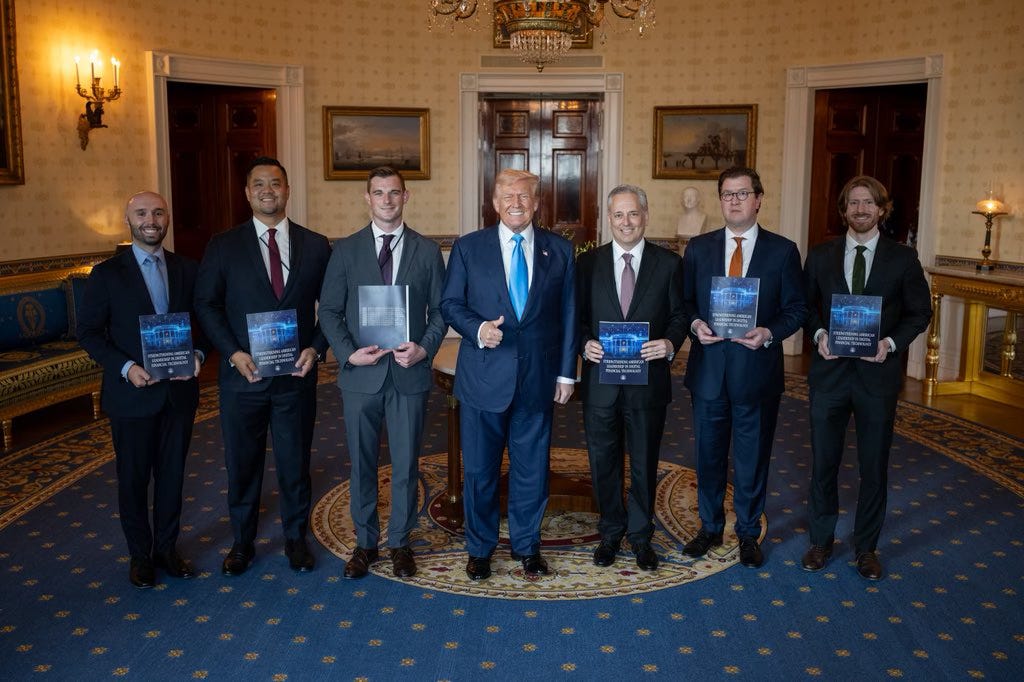Bo Hines Departs White House Crypto Council to Return to Private Sector
The former Executive Director discusses his legacy and next steps
Bo Hines, a key architect behind some of the White House’s biggest crypto initiatives this year, surprised the industry over the weekend by announcing he’s stepping down as Executive Director of the White House Crypto Council after just seven months to return to the private sector.
In an exclusive interview with Crypto In America, Hines, a former GOP Congressional candidate and growth equity partner before joining the Trump administration, said he’s still finalizing his next steps but plans to stay engaged with the crypto world. While he remained tight-lipped about the exact role he plans to take, he said he will have more to share in the coming weeks.
His departure comes as the Senate prepares to take up the CLARITY Act, a landmark market structure bill widely seen as critical to securing the $4 trillion crypto industry’s future in the United States. Though it was widely expected he would stay through its passage, Hines said he is leaving behind a strong foundation for the bill to move forward.
"I feel a lot of the heavy lifting has been done on CLARITY. The folks in the House did a phenomenal job building the core pillars. The Senate will add its stamp, and the White House digital assets report provides clear guidance to lawmakers and regulators alike, which should help push the bill through."
Hines described his tenure in Washington as a sprint at “tech speed,” highlighting his pride in the council’s open-door policy, which led to roughly 1,000 meetings with founders, investors, academics, and policy experts. He credits that collaboration with helping secure passage of the GENIUS Act, which established the first federal framework for stablecoins in the U.S.; organizing the first White House crypto summit, where President Trump met directly with some of the industry’s top leaders; and producing a 160-page interagency report on digital assets that outlined clear regulatory recommendations for the sector.
On his expected successor, Patrick Witt, Hines was complimentary.
“Patrick is one of the sharpest people I’ve ever met. He has an impressive background — Yale quarterback, Harvard Law grad, McKinsey consultant, and government service. His credentials will serve the council well.”
Since announcing his departure, a handful of Bitcoin proponents have expressed disappointment that Hines, a supporter of the U.S. government buying Bitcoin, was leaving without sharing more details on the progress of that initiative. Hines said he is confident the effort remains in good hands.
“The President’s Executive Order is a clear directive to build a strategic Bitcoin reserve. These initiatives are budget-neutral and designed to benefit taxpayers. I’m confident the effort will continue and accelerate under Patrick’s leadership, with capable teams at Treasury and Commerce working hard to implement the best solutions.”
Although Friday was his last day leading the crypto council, Hines will remain in public service as a special government employee — a temporary, part-time role that lets experts advise the government while continuing to work in the private sector. In this capacity, he plans to assist AI and Crypto Czar David Sacks with AI policy initiatives.
“AI and crypto share a lot of parallels in technology and legislative challenges and I’m excited to jump in and help push some important initiatives forward.”
Sacks thanked Hines for his work and accomplishments in an X post on Saturday, adding that he will be sorely missed.
Hines also expressed deep admiration for President Trump.
“I truly believe he is the greatest president in U.S. history. What he has accomplished is remarkable, and I think history will look very favorably upon his legacy. It was an honor to serve in his administration.”
On a personal note, Hines admitted the transition out of public life has at least one silver lining. “I actually made it to the gym this morning,” he laughed. “That alone feels like a win.”
When asked if he felt he had accomplished what he set out to do in January, Hines didn’t hesitate. “We set out to create a framework that positions the U.S. as the crypto capital of the world — and I believe we’ve done that.”






